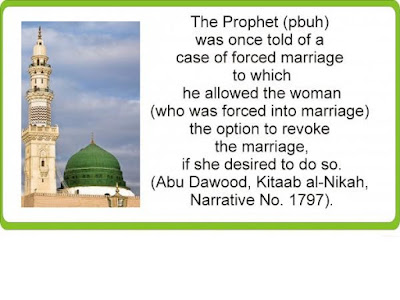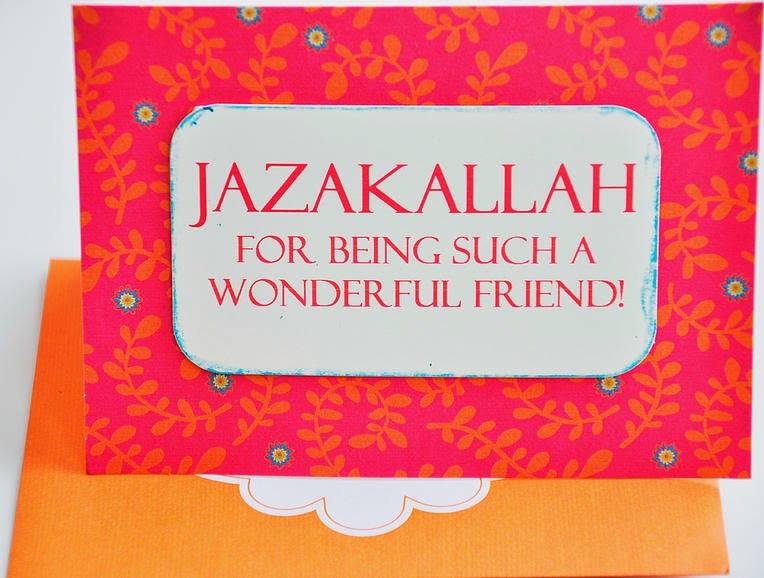Concept of Marriage in Islam
In Islam, marriage is a legal contract between two people. The bride is to consent to the marriage of her own free will. A formal, binding contract is considered integral to a religiously valid Islamic marriage, and outlines the rights and responsibilities of the groom and bride.Marriage is an act of Sunnah in Islam and is highly recommended.
Allah says in Qur'an:
"And among His signs is this, that He created for you mates from among yourselves, that you may dwell in peace and tranquility with them, and He has put love and mercy between your (hearts): Verily in that are signs for those who reflect� (Quran 30:21).
�And marry those among you who are single and those who are fit among your male slaves and your female slaves; if they are needy, Allah will make them free from want out of His grace; and Allah is Ample-giving, Knowing.� (Surah an-Nur, 24:32)
�O Humans revere your Guardian Lord, Who created you from a single person created of like nature its mate, and from this scattered (like seeds) countless men and women. Reverence Allah through Whom you claim your mutual rights� (Quran 4:1).
"And Allah has made for you your mates of your own nature, and made for you, out of them, sons and daughters and grandchildren, and provided for you sustenance of the best." [Noble Quran 16:72]
Prophet Muhammad (P.B.U.H) said:
"O you young men! Whoever is able to marry should marry, for that will help him to lower his gaze and guard his modesty." [Al-Bukhari]
"Marriage is my sunnah. Whosoever keeps away from it is not from me."
"Modesty was regarded as a great virtue by the Prophet. He said, "Modesty is part of faith." [Al-Bukhari]
Prophet (peace and blessings of Allaah be upon him) said: �No previously-married woman (widow or divorcee) may be married until she has been asked about her wishes (i.e., she should state clearly her wishes), and no virgin should be married until her permission has been asked (i.e., until she has agreed either in words or by remaining silent).� They asked, �O Messenger of Allaah, how is her permission given (because she will feel very shy)?� He said: �By her silence.� (Reported by al-Bukhaari, 4741)
The Prophet (peace and blessings of Allaah be upon him) said: �Any woman who marries without the permission of her walee, her marriage is invalid, her marriage is invalid, her marriage is invalid.� (Reported by al-Tirmidhi, 1021 and others; it is a saheeh hadeeth)
The Prophet (peace and blessings of Allaah be upon him) said: �There is no marriage contract except with a walee and two witnesses.� (Reported by al-Tabaraani; see also Saheeh al-Jaami�, 7558)
The Prophet (peace and blessings of Allaah be upon him) said: �Announce marriages.� (Reported by Imaam Ahmad; classed as hasan in Saheeh al-Jaami�, 1027)
The Prophet (peace and blessings of Allaah be upon him) said: �No woman may conduct the marriage contract of another woman, and no woman can conduct the marriage contract on behalf of her own self, because the zaaniyah (fornicatress, adulteress) is the one who arranges things on her own behalf.� (Reported by Ibn Maajah, 1782; see also Saheeh al-Jaami�, 7298)
Forced Marriage is Haram in Islam:
Forced marriages are totally unacceptable in Islam. Islam regards marriage as a right of the individual and therefore others cannot make the decision for them. If a woman/man is forced in marriage then the marriage would not be valid and would therefore need to be cancelled. However, daughters and sons should also recognize the rights of their parents and come to an agreed solution before the marriage takes place.
If this does not happen then those who forced the marriage and those who allowed it are both guilty and have committed a major sin.
Rules of Marriage
Consent of Wali and Spouses
Man and woman agree together to lead married life and this agreement is called nikah (marriage), and the two parties accept the responsibilities and obligations and thus live together as husband and wife.
For nikah it is necessary that both man and woman have attained the age of puberty-the age of full bloom and strength (4:6, 40:67). Nikah is not possible without mutual consent of both the parties in the presence of at least two witnesses, one from the side of the man and the other from the side of woman. (Man and woman have free choice to marry each other (4:3, 19) Men have been forbidden to marry women against their will, they cannot marry without obtaining consent of women and thus become their masters instead of companion. (4:19) The criterion for selection of spouse should be the unanimity of ideology and faith in Islam, and this is the reason why a momin (Believer-man) is forbidden to marry a mushrika (Unbeliever-woman) vice versa, and thus to save home from becoming hell whereas Allah wants it to become heaven (2:221).
Nikah should be performed in a declared manner, and the relationship between the spouses should not be kept a secret. If it is performed secretly it is not legal. (4:25; 5:5) The Quran has not suggested any ceremony for nikah, nor it has mentioned about involvement of a (third) person to perform it. Since nikah is an agreement between two parties, government can formulate rules and regulations (marriage Act), and it has to be performed accordingly.
For those who are capable of getting married the society has to provide facilities for nikah. (24:32) Those who could not get facilities to get married should keep themselves chaste by self-control till they get alliance. [(24:33)-VI, p.803] Prostitution is prohibited.
Married couple is forbidden from sexual Intercourse when:
(I) The women is not in normal physical condition i.e. during menses, and after this period they can have it as per the natural laws (2:222);
(ii) When either of them or both are observing fast (of course from dawn to dusk) (2:187); and
(iii) Even from dusk to dawn when one is in retreat in the mosque (for some assignment). (2:187)
Certain women (relationships) are forbidden for nikah. They are:
(1) Yours mothers
(2) Your daughters
(3) Your sisters
(4) Your father�s sisters
(5) Your mother�s sisters
(6) Your brother�s daughters
(7) Your sister�s daughters
(8) Your foster mothers
(9) Your foster sisters
(10) Mothers of your wives
(11) Your stepdaughters, which have been brought up under your guardianship and are born of wives with whom you have had marital relations. If you have not had marital relations then the prohibition does not apply.
(12) Wives of your real sons.
(13) It is also prohibited to have in marriage two sisters at the same time.
Also forbidden to you in marriage are those women who are already married except those whom you already possess. (4:23,24)
A Muslim man should not marry a mushrika (Unbeliever woman) until she accepts Islam; likewise Muslim woman should not marry mushrik man until he accepts Islam. (2:221) A Muslim woman cannot marry a man from amongst the people who believe in the earlier scriptures (5:5)
Mehar
"Mahr is a wife's right, which becomes binding upon the husband once the marriage is contracted. It is fully payable after the consummation of marriage but if divorce occurs before the consummation of marriage then half of the Mahr is required to be paid unless the wife or her guardians waive it. Allah says: "And give unto the women, (whom ye marry) free gift of their marriage portions..." (An-Nisa': 4)
He Almighty also says: "And those of whom ye seek content (by marrying them), give unto them their portions as a duty..." (An-Nisa': 24)
Mahr is very important in Islamic marriage. Allah has used the word "faridah" for it. It means something fixed, decided and obligatory. It is obligatory on the husband to pay mahr to his wife unless she expressly by her own will without any pressure forgives him or returns the amount of mahr to him. Mahr belongs to the wife and it is to be given to her only. It is not the property of her parents or her guardian. No one can forgive the husband to pay the Mahr except the wife herself or, in case she did not go to her husband and the marriage ended without consummation, then in that situation her guardian can also forgive the mahr on her behalf. If a husband dies without paying mahr to his wife, it will be an outstanding debt on him and it must be paid before the distribution of his inheritance among his heirs.
It is a woman's right and it signifies a husband's love and appreciation for his wife. In the Qur'an it is called "sadaqah" which means a token of friendship. It is also called "nihlah" which means "a nice gift or present." Mahr also signifies a husband's commitment to take care of his wife's financial needs (nafaqah).
According to the Shari`ah, the mahr should also be reasonable. There is no fixed amount of mahr in the Shari`ah. It should be given according to the financial status of the husband and according to the time and place.
However, it is a principle of the Shari`ah that the mahr should not be too expensive. It is wrong to declare large amount of mahr at the time of marriage to show off or to boast. Some time bride's family put pressure on the groom and his family for a large amount of mahr so that they may show their pride to their relatives and friends boasting that their daughter was married for a big mahr. Sometimes the groom declares a big amount and secretly thinks that this is just a commitment on paper. People are often heard saying, "Write whatever you want, no one asks and no one pays." This is playing a game with the rules of Allah. Muslims should only commit to what they are really capable of paying and what they intend to pay. It is haram to enjoy relations with a wife and then deny her the mahr when she demands."
Wedding Khutbah
This is a typical Muslim nikah khutbah (wedding speech) that would be given by an Imam at a Muslim wedding.
Walima
Walima or the marriage banquet, is the second of the two traditional parts of an Islamic wedding. The walima is performed after the nikah, or marriage ceremony. The word walima is derived from awlam, meaning to gather or assemble. It designates a feast in Arabic . Walima is used as a symbol to show domestic happiness in the household post-marriage] While walima is often used to describe a celebration of marriage.












































